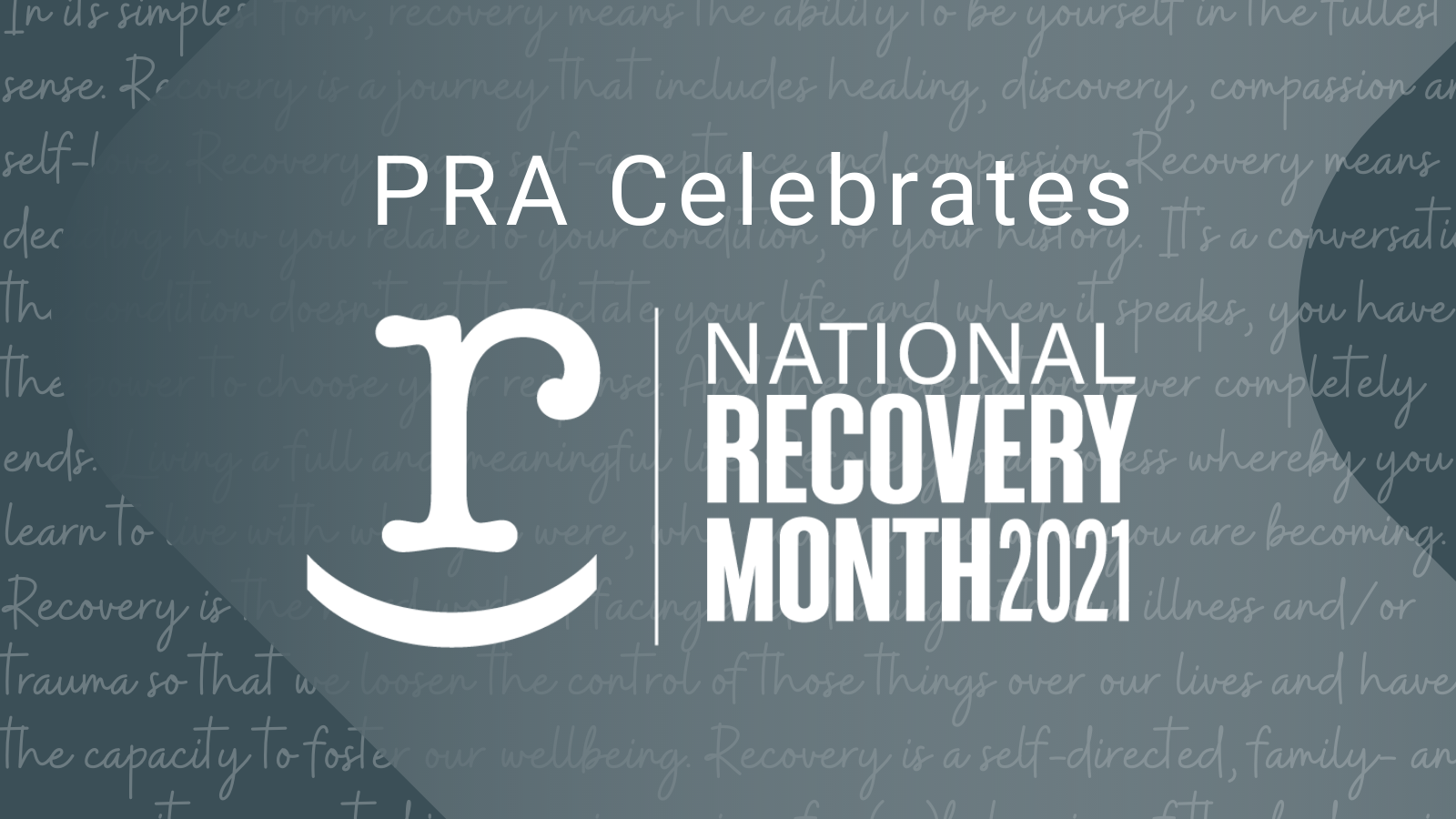September is National Recovery Month, an honorary occasion dedicated to celebrating personal gains and evidence-based advances toward recovery. It’s for people in recovery from behavioral health conditions, and for those who may someday be. It’s for their friends and families. And it’s for the people who work to support others on their way, many with a recovery experience of their own. As the 2021 National Recovery Month theme says, “Recovery is for everyone: every person, every family, every community.”
To mark 2021’s National Recovery Month, PRA staff shared reflections in response to the question “What does recovery mean to you?” as well as resources and recovery supports they wanted to highlight. Celebrate with us by reading through their answers below and by considering the question yourself.
What Does Recovery Mean to You?
- In its simplest form, recovery means the ability to be yourself in the fullest sense.
- Recovery is a journey that includes healing, discovery, compassion, and self-love.
- Recovery means self-acceptance and compassion.
- Recovery means deciding how you relate to your condition, or your history. It’s a conversation—the condition doesn’t get to dictate your life, and when it speaks, you have the power to choose your response. And the conversation never completely ends.
- Living a full and meaningful life.
- Recovery is a process whereby you learn to live with who you were, who you are, and who you are becoming.
- Recovery is the hard work of facing and dealing with our illness and/or trauma so that we loosen the control of those things over our lives and have the capacity to foster our wellbeing.
- Recovery is a self-directed, family- and community-supported journey in service of a (re)balancing of the body-mind-spirit.
- Recovery can mean many different things to many different people. For me, a big part of my definition of recovery is self-acceptance, personal growth, and forgiveness—from those who you have harmed, for those who have harmed you, and for your own self.
- To me, recovery means to keep trying. It involves recognition of one’s humanity and a daily renewal of our commitment to a better future. We forgive ourselves and never stop trying.
- Recovery to me means life. A person in recovery is working hard every day to live their best life and accepts that returning to use may be part of their recovery journey.
- Recovery means the process of building resilience and avenues that allow you to thrive and be well.
- Recovery means overcoming hardship.
Staff-Noted Resources and Recovery Supports*
*These are resources and recovery supports of note to our staff, and their inclusion here does not constitute an endorsement by PRA.
- The Addicted Mind (podcast)
- Behavioral health equity
- The Butt Stops Here©
- Clinical or diagnostic genetic testing
- Community-based peer support
- Equine therapy (e.g., eagala)
- Mainstream benefits, such as Social Security Disability Insurance (SSDI) and Supplemental Security Income (SSI)
- Mental Illness Happy Hour (podcast)
- Nutritional psychiatry
- Self-Management and Recovery Training (SMART) Recovery
- Wellness Recovery Action Plan (WRAP)
- Wildflower Alliance
- Y12SR
- “6 Ways to Take a Break From Drinking”
Need Help?
If you or someone in your life has a substance use disorder or mental health condition, help is available. You can call the Substance Abuse and Mental Health Services Administrations’ (SAMHSA) 24/7, 365-days-a-year National Helpline at 1-800-662-HELP (4357) for information in English or Spanish, such as referrals to local treatment facilities, support groups, and community-based organizations. Or you can use SAMHSA’s Behavioral Health Treatment Services Locator to find providers in your area. If you’re thinking about suicide, or are worried about a friend or loved one, there are free and confidential options available any time of day: call the National Suicide Prevention Lifeline at 1-800-273-8255 to speak with staff at a local crisis center, or use the Lifeline Chat to connect via webchat with a counselor for emotional support and other services.


